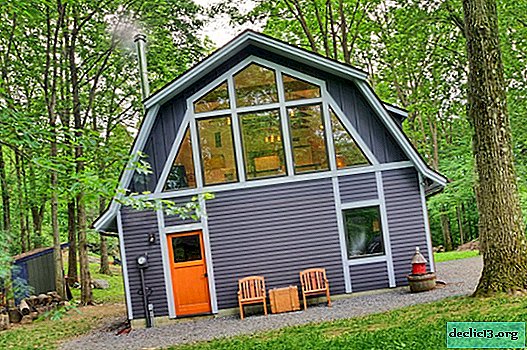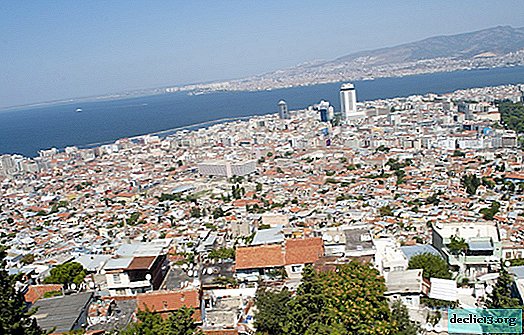Ambrosia - when it blooms, benefits and harms

Children and adults are looking forward to spring and summer. And now the cold days are replaced by warm days. The sun's rays become hotter, birds singing is heard, the grass begins to turn green, the first flowers appear. Unfortunately, this time is not pleasant and harmless for everyone. Along with summer days comes an allergy that is caused by pollen from plants.
What is ragweed

The plant has a thick stem on which carved leaflets are densely located. They give attractiveness. Ambrosia grows throughout the south of Russia.
Ambrosia is a weed, and the sonorous name is borrowed from the name of fragrant ointment, which the ancient Greek gods rubbed into the skin. The leaf shape resembles wormwood, it is annual and perennial, it belongs to the family of asters. Reaches two meters in height, and as a root grows up to four meters. The length of the leaves is up to 15 centimeters. The upper leaves have light green hues, as they approach the root they darken, the lowest leaves are closer to gray. Flowering time depends on the species (from July to October).
Where does it meet
Ambrosia is from North America. The plant is difficult to breed, it multiplies rapidly in areas of cottages or private homes.
In the wasteland can be found in Ukraine, Belarus and the southern part of Russia. Weed grows along the roads. It is actively growing closer to mid-April; in June, growth and further development is carried out. Leafwort ragweed is considered a malicious weed, with a zone of spread up to the Pacific Ocean.
Ambrosia resembles medicinal herbs, which allows it to grow with impunity. People do not exterminate it precisely for this reason, although the pollen of a flowering weed causes a strong allergic reaction, up to asphyxiation.
When ragweed blooms
The most difficult period for allergy sufferers is summer. The flowering period of ragweed is especially difficult to tolerate. An allergic reaction exhausts a person in one season, so that he comes to his senses until next year.
INFORMATION! Weed seedlings appear from May to June. From late June to early August, flowering occurs, which continues until October. Seed ripening occurs in August.Seeds entered the territory of Russia by chance. They were brought in with grain that was sown in fields with cereal crops. At first, the plant began to grow in the south of Russia, on the territory of the Krasnodar Territory, where climatic conditions are similar to the native land of the weed - North America.
Due to global warming, ragweed began spreading in temperate latitudes, indicating seed vitality. An adult plant is capable of producing 40 thousand seeds that can germinate in any conditions. Seeds retain properties for reproduction even after 40 years.
The harm caused by ragweed

Ambrosia, despite its attractive name, causes many problems not only to land owners, but also causes significant damage to health, in severe cases leading to death. At the time of flowering, pollen begins to irritate the respiratory tract, which makes breathing difficult. It is for this reason that the weed belongs to the quarantine facility.
For man
Any person in contact with ragweed encounters a serious allergic reaction caused by pollen. An acute asthma attack may even occur.
Pollen is small in size, which allows it to freely enter the respiratory tract. If it enters the mucous membrane, it causes irritation, which entails the appearance of allergies. Reactions are different - from fever to asthma.
Avoid contact with the plant during pregnancy and lactation. If medications are prescribed, which include ragweed, you should consult your doctor.
For ecology
A weed plant causes irreparable harm not only to human health, but also to the environment.
Ambrosia significantly depletes the soil. As soon as a seed appears that grows to a shoot, in just a couple of years, the entire territory is covered with a weed of this species. Such stability is promoted by a root growing up to 4 meters. He draws water from a depth to which cereal plants are not able to reach.
INFORMATION! Scientists conducted a series of experiments, as a result of which it was revealed that for the growth of ragweed to a mass of one kilogram, it is necessary to obtain 1 ton of moisture, almost 2 kilograms of phosphorus and about 16 kilograms of nitrogen. Thus, if weed is completely exterminated in one territory, soil cannot be used for sowing for a long time.At the time of growth, weed inhibits cultivated plants. When ragweed sprouted and began to pick up greens, it gains the ability to obscure cereal crops, taking all the nutrients and moisture out of the soil. In those places where ragweed appears, cultivated plants begin to reduce yield.
In the process of growth, it displaces grass from meadows. Getting into the hay, significantly reduces feed quality. Over time, begins to replace the honey plant, which contributes to the deterioration of the equilibrium in the biocenosis.
Video plotBeneficial features
Many believe that ragweed is harmful and must be eradicated as soon as possible. This issue is being dealt with at the highest level. In many cities and towns there are decrees for the extermination of plants. Despite this, ragweed is often used in folk medicine. This is due to the fact that it contains useful substances.
Use in medicine
The plant is rich in essential oils, minerals, vitamins and many other beneficial substances. For therapeutics, all parts are used - from seeds to roots. In most cases, tinctures are prepared, which include alcohol. The drug is used externally or internally.
Ambrosia is widely used as a medicinal herb. Its main application is the fight against parasites that appear in the digestive tract. The plant has anti-inflammatory properties, lowers fever. Used for dysentery.
INFORMATION! Many studies have been carried out, as a result of which it became clear that some of the substances contained in ragweed are inhibitors of the growth of cancer cells. Thus, it is used in the fight against a malignant tumor of the nasopharynx.If you stretch the leaves, the gruel can be used as a compress for bruises and wounds. Homeopaths are used as the basis for creating allergy medications.
Ambrosia essential oil has a pronounced aroma. Therefore, the plant was named after a fragrant ointment. Smell can cause a headache.
Healing properties
Ambrosia is not an easy plant and this is not surprising. It is both deadly and medicinal. The weed is rich in beneficial substances, which in small doses are used as a medicine.
The main areas of application:
- Bruises.
- Diarrhea.
- Fever.
- Dysentery.
Doctors have revealed that most types of ragweed have bactericidal properties. The plant contributes to the destruction of cancer cells, and in some cases prevents their appearance.
Video plotHow to deal with ragweed allergy in adults and children
Allergists attribute the plant to one of the most harmful, aggressive and dangerous species. This is due to the fact that pollen can not only cause allergies, but also lead to death.
For the appearance of allergies, it is not necessary that the plant is in close proximity. Pollen can affect a person even hundreds of meters away.
Signs and symptoms of an allergy
Ambrosia is usually referred to as a quarantine weed, since when it comes in contact with skin, mucous membranes or when ingested, an allergic reaction occurs. A large percentage of allergies not only in adults but also in children, especially at the time of flowering in July and August. Pollen is especially dangerous for pregnant women.
Allergic symptoms include:
- Runny nose and nasal congestion.
- Itching on the legs and arms in contact with the plants.
- The level of itching increases each time.
- Redness of the skin and eyes.
- Discomfort in the throat.
- Cough begins.
- The skin swells.
- Increased sweating.
- Headache, nausea.
Severe allergies occur during pregnancy. Fatigue appears, appetite disappears, mood worsens. If there was direct contact with ragweed, a swelling appears on the face that spreads to the lips, eyes, arms and legs, cough, migraine appears.
Allergies are difficult for children. In addition to weakness, coughing and pain in the head, the temperature may rise, which is accompanied by suffocation. If the allergic reaction is long, the child may have an asthma attack.
ATTENTION! If allergy symptoms appear, you should immediately contact a medical institution.Medications

If you suspect an allergy, be sure to consult a doctor. The disease proceeds more slowly if the contact with pollen was not through personal contact. Drugs are prescribed only after the patient is examined by a specialist.
- Loratadine. Helps prevent the appearance of edema, removes them.
- Claritin. For adults, they are released in tablets, for children, syrup is provided. Apply the medicine once a day.
- Suprastin. Available in the form of tablets and ampoules. Treatment of children under one year of age should be carried out under the strict supervision of a physician.
- Aleron. The drug is available in tablets, helps to eliminate allergic symptoms. The medicine has many positive reviews.
- "Cetirizine." One of the drugs that instantly eliminates the problem. Can be used by adults and children over 12 years old.
- Tavigil. Designed for children over 12 years old.
Medications relieve allergy symptoms. To stabilize the condition, it is recommended to use drops for the nose and eyes, to use drugs that relieve swelling and pain.
Folk methods

Before starting treatment for an allergic reaction, consult a doctor. This is necessary so as not to harm the body. Folk remedies help improve the general condition.
- Celery leaves are passed through a meat grinder. Squeeze the juice into which honey is added in proportions of three to one. Use 3 times a day for 2 tablespoons.
- About 9 tablespoons of pine needles, 2 tablespoons of chopped rose hips, 1 tablespoon of onion husks are poured with water and put on fire for 15 minutes. The resulting broth is filtered and drunk as tea 3 times a day.
- 1 teaspoon of caraway seeds and 1 tablespoon of pumpkin peel are poured with water and the mixture is brought to a boil, after which it is cooked for 20 minutes. The cooled broth is consumed in 100 ml twice a day.
- Nettle will help get rid of itching. To do this, take 1 tablespoon of nettle, pour water and bring to a boil. Cook for 20 minutes. The broth is consumed in a warm form throughout the day about 6 times. If necessary, can be used externally. Caution should be used by pregnant women, the elderly and children.
How to overcome ragweed in the country

At first glance, the plant seems harmless, which is not so. Ambrosia acts as an invulnerable enemy resistant to most chemicals.
There are many chemicals that can easily destroy weeds at any stage of growth, but none of them can cope with ragweed. On pastures or crops, such substances are not allowed to be used.
- The main way to get rid of ragweed is to remove along with the root, which is quite difficult, given its length. Weed can be cut before flowering, but not for long. The plant grows rapidly and in place of one new two appear. The most important thing is to start work on time, until the time of flowering and seed formation.
- As a struggle, use and refinement of the site. The wasteland on which weed grows can be planted with flower beds, make alleys and sidewalks.
- Grass cultures are planted on the side of the road that impede distribution, such as legumes. This option is also suitable for removal from the fields.
- In some cases, insects called Ambrosia leaf beetles come to the rescue. The bugs eat young ragweed, destroying it. Unfortunately, insects in Russia could not take root. But scientists are trying to develop new species.
Why is the plant so durable?
In northern America, the birthplace of ragweed, there are many insects and other plant species that destroy the weed. In Russia, such methods are not used, since it is difficult for insects to get used to climatic conditions.
The weed is not afraid of drought, thanks to its long roots, and adult species can annually bring from 40 to 140 thousand seeds. Seeds can sprout even after several decades.
Video tipsAt that moment, when it became clear that ragweed appeared on the site and it was not possible to deal with it, it was worth contacting the quarantine department for help.

















